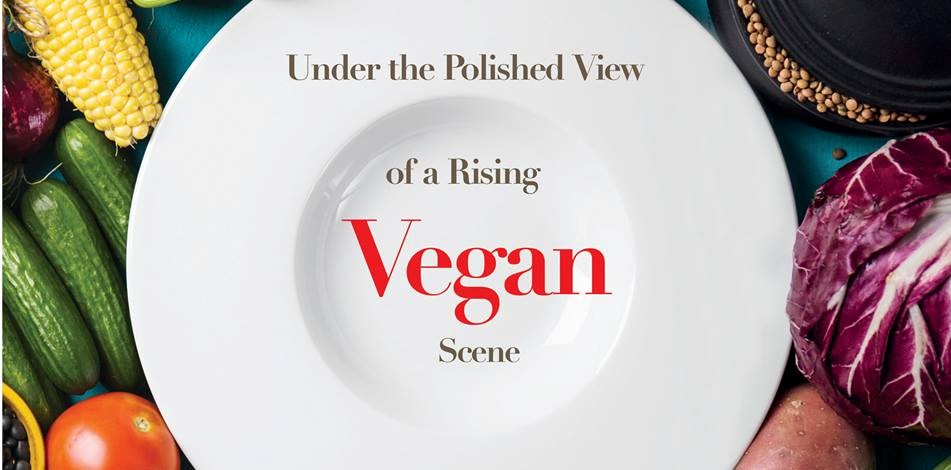“As with any trend in Egypt, a good percentage of customers are hopping on the bandwagon to be en vogue,” says Susan Milbank, owner of ElMarket, a store that sells a variety of vegan and gluten-free products. “Of course, I do believe a lot of people buying vegan alternatives are seriously seeking a healthier lifestyle, and in fact, the market size is growing at a promising rate.” Perhaps this is the million-dollar question: Is catering to the vegan and allergy-conscious market a viable business venture or simply an elite fad?
A vegan, by definition, consumes neither animal products nor products where animals were harmed during the process of their production, such as dairy and honey.
From the consumer side, a clear need can be seen. All those interviewed have reported a significant lack of businesses —in terms of both packaged products and restaurants— that cater to vegans or those with special dietary needs. Samiha el Refay, a TV presenter, has been a vegan for a year and a vegetarian for six, to date knows of only one bakery in Cairo that accommodates her dietary needs. “It gets very frustrating to always have to cook my food at home,” she says, adding that most ingredients needed to create nutritious vegan recipes are too expensive, such as quinoa and avocados.
Nathalie Fraiman, a housewife who moved with her husband to Egypt six months ago, shares a similar concern: “Given that Egypt’s poor-man cuisine is highly plant-based, you would expect it to be easier to find vegan options at restaurants in Cairo. Since we moved here, we have eaten at home almost every single night, something that never happened in any country we lived in before.”
Fraiman’s initial perception taps into a common complaint about the local culture. All those interviewed – including business owners – have reported a lack of interest by restaurants and food outlets in accommodating the needs of vegans, despite somewhat catering to the vegan-like Christian fasting menu known as “ Seyami .” Andrew Guirguis, an industrial engineer who has been a vegan for two years, gave up on trying to eat out some time ago. “The majority do not respect my decision to be vegan, nor do they respect the existence of the culture,” he says. “It is a very common occurrence that bakeries and restaurants sell me products claiming to be suitable for my diet, only to discover later that I can taste and smell the eggs.”
Economic theories postulate that the existence of demand for a product or service by default should automatically result in the creation of supply. However, the market is clearly lacking the presence of sufficient vegan-focused businesses, be it small- and medium-sized enterprises (SMEs) or large corporations.
An Arduous Ignite
Yasmine Nazmy is one of the early vegan entrepreneurs in Egypt who has ventured into several businesses, including: co-ownership of The Vegan Kitchen, the country’s first gourmet vegan restaurant; Earthly Delights, a catering service; KAJU, an ice cream and prepared food brand; and most recently Happy Belly, the first Egyptian plant-based cookbook. Nazmy has faced a different set of challenges with each venture. “The term ‘vegan’ didn’t exist in Egypt in 2014, not in restaurant menus or on labels, Seyami yes, but it was still very seasonal,” she explains, adding that the idea of opening a vegan restaurant was a natural extension of the need to “have a place where people can order healthy food without complicating things.”
While opening any restaurant comes with its own set of operational and economic challenges, Nazmy had to deal with an additional set of hurdles. “During our launch, people kept saying we would only get 10 visitors a day; many people didn’t believe a vegan business could succeed in Egypt at the time,” she recalls. “Luckily, that turned out to be untrue.” The business grew by itself, mostly with the help of a few events to raise awareness of veganism and by word-of-mouth, she says. Only a minority of the restaurant’s clientele were vegan, as most were vegetarians, people with allergies, and others interested in learning about the concept. “We didn’t do vegan junk, so we attracted healthy eaters in general,” she adds.
Furthermore, a core part of the operational challenges Nazmy faced in launching the restaurant was staff training. Unlike other industries, employees in any vegan business must learn about veganism and how to cater to the special needs of different clients, she says.
“I had to educate everyone from scratch, especially about the culture” she says. “To ease matters, I hired a Christian chef. However, all of the staff needed extensive training on how to address customer questions, the different dietary needs, and the importance of ensuring that certain ingredients don’t come in close proximity to each other to avoid aggravating anyone’s allergies,” Nazmy notes.
The Vegan Kitchen closed in late 2015 due to a dispute between the owners, causing Nazmy to venture into Earthly Delights and KAJU.
Facing the same challenge, Passand el Hammami, owner of Sea Salt Bakery, has built her products to cater to people with different dietary needs, and she has trained her bakers and waiters from scratch, as well. “The concept of bringing in employees and teaching them not to use butter is challenging,” she says. “They needed to learn what a client means when, for example, he says he is on a keto diet and how to quickly amend the recipe to accommodate it, and this is even more challenging.”
A Viable Market?
Even though vegan businesses are believed to serve a niche market, they tend to have a diverse customer-base. Nazmy who launched three businesses and spent years supporting the growth of a vegan community, believes the majority of her clients are not vegan; however, she adds, “I sell to businesses, too, so it is difficult to know exactly.”
Sharing a parallel perception of her clientele, ElMarket’s Milbank believes about half of her customers are “interested in trying something new or a bit healthier.”
Moreover, she believes several factors are fueling the growth of vegan businesses’ customer base. “The number of people who are seeking cleaner versions of regular products is growing remarkably. One example from my store is the number of customers seeking refined-sugar-free hazelnut spread to replace commercial brands” she says. “More people now want to know where their food comes from; they want to buy wholesome products. While this is a movement entirely separate from being vegan or vegetarian, it is definitely feeding the potential of this industry in Egypt,” Mailbank adds.
Sheila Hanney, owner of what is currently the only dedicated vegan restaurant in Egypt, the Marine Garden Camp in Dahab, similarly estimates only 3 percent of her clientele are strict vegans, in addition to some others suffering from different food intolerances. Nonetheless, the majority of her diners are a result of the limited healthy choices available in Dahab’s restaurants. “About 95 percent of our foot-traffic is just regular people looking to try something different than what’s available in nearby eateries,” she says.
Hanney believes that Dahab itself has played a crucial role in the stability of her customer traffic. “People here come from different backgrounds: Bedouins, urban Egyptians, and foreigners from all over the world,” she says. “That is why we never had any issues with cultural adaptation and securing clients.”
Cultural Limitations
Cultural adaptation and common perceptions in Egypt are believed to be core factors limiting the increase in supply of businesses that cater to this market.
Both Guirguis and el Refay express their frustration from always needing to justify their choices. From Guirguis’ perspective, the majority of the community approaches his lifestyle as veering off what is normal, correct, or acceptable. For el Refay, however, the conversation tends to take a religious angle. “It is well founded in the Egyptian culture that consuming meat is a religious obligation, especially during certain celebrations,” she says. “It gets very challenging to explain myself some of the time.”
For a foreigner like Fraiman, the pressure to conform to society’s definition of normality is not a real concern. “It is, however, one of the primary reasons entrepreneurs and corporations lack the motivation to start a vegan business. They just don’t think it is lucrative enough,” she explains.
Sea Salt Bakery’s owner shared the same concern, both as a businesswoman and as a consumer. “It is common to consume meat or chicken at least once a week; if you don’t, then something is wrong. It is also a [foreign and unaccepted] concept to completely cut out milk,” el Hammami says. Nevertheless, she strongly believes the level of awareness is growing and so is the number of vegan products in the market. “People say it is just a passing trend, but the figures convey a different message,” el Hamami stresses.
Furthermore, the small market and limited number of businesses catering to it are imposing several other limitations on the sector’s potential, chief among which is the average prices of vegan products as opposed to conventional commodities. Addressing the issue, Nazmy explains, “Any business can create cheaper vegan products; however, I like to offer products that are healthy and tasty, and that requires a mix of organic ingredients, premium ingredients, and imported ingredients, all of which are becoming much more expensive by the day.” Furthermore, the owner of KAJU believes “the nature of the niche market tends to result in a high operating costs.”
For Milbank, the whole issue is a result of the lack of availability of raw ingredients. “Like everyone else in the world, vegans and healthy eaters want food that [is similar to the conventional products.] This is available and easy to do with products available in other countries, but to produce the same product and quality in Egypt, you have to either create everything from scratch or import very expensive raw ingredients,” she exclaims.
Hanney, on the other hand does not see prices as a valid argument against adopting a vegan lifestyle. “Yes, there are crazy expensive vegan products, but the same is true for packaged meat products, and people still buy them in large quantities,” she says, adding that she tries her best to escape the rising cost of raw materials by relying mostly on locally grown ingredients, with the exception of some imported products, mainly premium raw cacao, to ensure a certain level of taste and quality.
Attempting another solution, el Hammami’s strategy was to acquire mills for the bakery not only to ensure that her products do not affect those sensitive to gluten, but to “withstand any import regulation and price volatility.”
Another byproduct of the young niche nature of the market is “the lack of a clear vegan community in Egypt, unlike in developed markets, such as Europe,” as Nazmy puts it. She believes that is why most vegan businesses in Egypt “tend to aim for a mixture of vegan, vegetarian, and gluten free offerings. Along the same line, el Hammami found it challenging to reach a suitable market with her message, she opted for more of a raising-awareness approach rather than “simply advertising everywhere.”
Further noting the undefined community, el Hammami emphasizes the large number of people who had no idea that certain products were easily available in Egypt. Not only that, she says, but “we often get asked where to get tested for allergies, unfortunately this information isn’t commonly available. This kind of business is very much a matter of community work, we won’t succeed if there are no doctors, nutritionists, coaches, and chefs raising awareness. We need to all help each other grow.”
FMCGs Play Hide and Seek
There is a clear absence of large corporations in the vegan market, especially for fast moving consumer goods (FMCG) companies, whether for non-meat or non-dairy products. Currently, only Lamar, a local brand, has introduced a dairy-free milk –made from almonds. The company, however, did not invest in promoting the product or its benefits: It is not mentioned on their website nor was it featured in any of their TV commercials, and the dairy-free milk was only mentioned once on the company’s Facebook Page.
The French brand Danone followed a similar approach. The company didn’t officially launch either of its two non-dairy milk brands, Silk and Alpro, in Egypt. However, both brands can sometimes be found at niche stores in limited quantities.
Adopting a different approach is Juhayna, Egypt’s oldest dairy brand. The company produced a lactose-free dairy milk to cater to the lactose-intolerant population and launched a campaign educating the masses about its benefits. Heba Thabet, the company’s business development director, attributes the rationale of sticking with dairy instead of opting for a non-dairy alternative to two factors: market viability and image.
“Of course, venturing into the non-dairy industry was considered, however, after studying the idea we discovered there wasn’t a sufficient market need. Moreover, our marketing image and brand needs to remain dairy-focused,” she explains. “We are a dairy company, so why would we veer off dairy if we have a suitable solution to lactose intolerance, which is the main issue we are trying to address. Most of the new clientele we are targeting are people who want to consume milk, but can’t.”
Explaining the difference between the potential of both markets, Thabet believes that people interested in using dairy-free milk, such as almond, soy, or coconut, constitute a very small niche market. “While it is true that lactose intolerance is a niche market as well, it is nevertheless a promising one to venture into,” she says, noting that the World Health Organization estimates 70 percent of the global population suffers from some level of lactose-intolerance and is unaware of it.
“We believe this segment might grow over time, with proper awareness campaigns of course, as opposed to the very niche non-dairy market. There isn’t a strong need for it.”
The Green Road Ahead
On the SME side, the perception is more optimistic, with a few roadblocks. As Milbank puts it: “The vegan community and its market influence are developing a staggering pace, even in comparison to one year ago.”
Despite market concerns, escalating prices, and lack of a defined community, the prospects for vegans are showing clear signs of growth. All entrepreneurs interviewed stress the rising size of their customer-base. “Turning the vegan industry into a strong and viable market is something that is bound to happen,” says el Hammami, “even if the size is not currently attractive to larger businesses, it is growing.”







